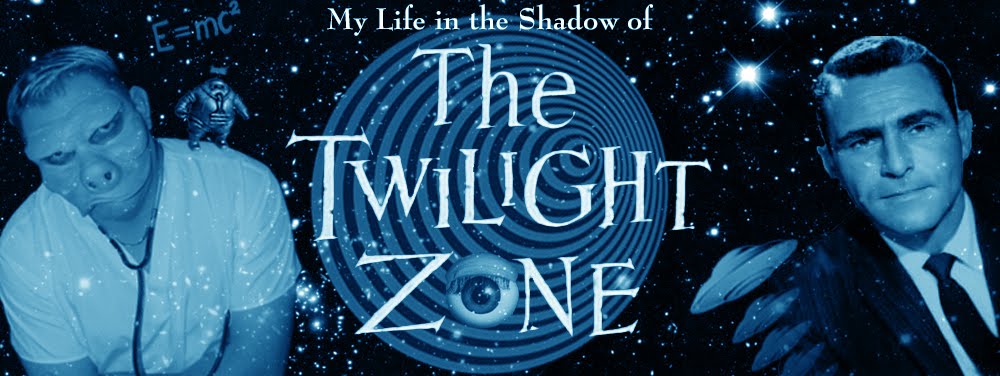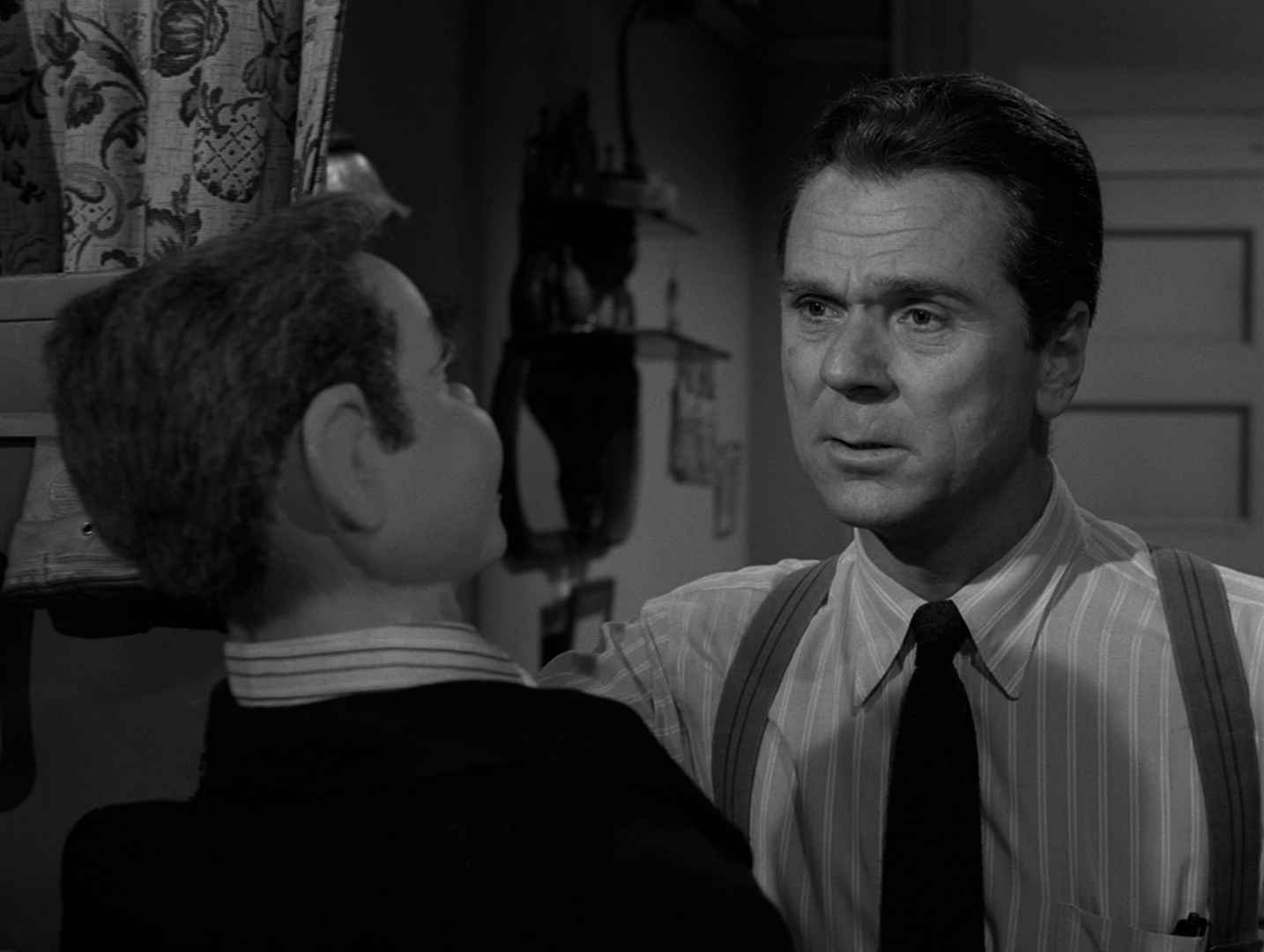Season 5, Episode 30 (150 overall)
Originally aired 4/24/1964
Cayuga Production # 2611
Ah, the hangover. You wake up disoriented, your head throbbing, your mouth dry and pasty, the previous night a disjointed blur. “Where am I?” you ask yourself feebly. “What happened? Oh god, I drank so much I blacked out. How big an ass did I make of myself? Never again, goddammit. Never again.” Fifty years ago tonight, a young couple joined the illustrious ranks of the bleary-eyed party goers in search of their bearings… only these two have much bigger issues to sort out.
 Bob and Millie Frazier wake up in a strange house in a strange town, hung over and unsure what transpired the night before. Millie vaguely remembers having to drive (since Bob was too drunk to do so) and seeing a large shadow loom over their car. They hear the giggling of a little girl, but can’t find her as they search their surroundings for a clue as to where they are.
Bob and Millie Frazier wake up in a strange house in a strange town, hung over and unsure what transpired the night before. Millie vaguely remembers having to drive (since Bob was too drunk to do so) and seeing a large shadow loom over their car. They hear the giggling of a little girl, but can’t find her as they search their surroundings for a clue as to where they are.
They gradually notice that everything is fake --- appliances, food, trees (complete with a stuffed squirrel), even the grass is nothing more than papier-mâché. They find a car, but there’s a mannequin at the wheel and no engine under the hood. They can’t shake the odd sensation that, despite the absolute lack of people to be found, they are being watched. They begin to ask themselves the typical Twilight Zone questions: is it an elaborate joke? Are they dreaming? Are they dead?

They find a railway station and board a train, which goes in a circle and returns them to where they started. They exit the train and are terrified to see a giant shadow looming over them. They make a run for it, but are quickly scooped up by a gigantic hand. They stare up in horror at the enormous face of a little girl, the source of the laughter they’ve been hearing all morning. It seems her father brought the Fraziers to her “all the way from Earth,” and they’ll be the perfect toys for her sprawling small-town playset.
“Stopover in a Quiet Town” is written by Earl Hamner Jr., who is better known for his more rural contributions to the series (“Jess-Belle,” “The Hunt,” etc.). It’s competently written (more so than many season five episodes); unfortunately, it rips off Rod Serling’s “Where Is Everybody?”. and blatantly so. Aside from the basic story idea (a seemingly-populated town inexplicably absent its populace), Hamner lifts very specific story details, the most glaring of which concerns a mannequin sitting inside a parked car (though the accompanying crane shot is quite nice). The ending is of course completely different here, and is clever and surprising enough to at least partially make up for the obvious pilfering.
The direction by Ron Winston (who also helmed “The Big Tall Wish” and “The Monsters Are Due on Maple Street,” both in season one) is fine but not remarkable; however, the optical effects used for the climax are quite impressive (similar shots of miniature people in the hands of giants in season three’s “The Little People” and season four’s “Miniature” aren’t quite as as cleanly achieved).
 |
| "The Little People" (left), "Miniature" (right) |
.
.
Speaking of “The Little People,” it ends quite similarly to “Stopover,” except that the tiny Earthling in that episode ends up crushed to death in the giant astronaut’s hand. I can’t help but wonder if those enormous astronauts hail from the unnamed planet depicted here. Speaking of which, it seems highly unlikely that the alien child’s town playset would be such a dead ringer for an Earth town; moreover, what are the odds that the Fraziers --- (comparatively miniature) aliens from another world --- would be exact fits for it?
THE MUSIC
“Stopover in a Quiet Town” is stock-scored almost exclusively with Jerry Goldsmith cues from scores from “The Invaders,” "Back There,” and “The Big Tall Wish.” It’s interesting that “The Invaders” score was used, since that episode also concerns tiny Earth men.
DRAMATIS PERSONAE
Bob Frazier is played by Barry Nelson in his only Twilight Zone appearance. Other genre credits include roles on Alfred Hitchcock Presents (“The Waxwork”), The Alfred Hitchcock Hour (“Misadventure” and “Anyone for Murder?”), and the original Battlestar Galactica (“The Magnificent Warriors”). On the big screen, he played Stuart Ullman in Stanley Kubrick’s 1980 adaptation of Stephen King’s The Shining.
 Nancy Malone (Millie Frazier) is also TZ one-timer, but she also showed up over on ABC’s The Outer Limits (“Fun and Games,” which just turned 50 a few weeks ago). Malone also directed two episodes of Star Trek: Voyager (“Coda” and “Message in a Bottle”) and, speaking of that venerable sci-fi institution, she can be seen in The Green Girl, a 2014 documentary about the life and career of Trek icon (and TZ alum) Susan Oliver.
Nancy Malone (Millie Frazier) is also TZ one-timer, but she also showed up over on ABC’s The Outer Limits (“Fun and Games,” which just turned 50 a few weeks ago). Malone also directed two episodes of Star Trek: Voyager (“Coda” and “Message in a Bottle”) and, speaking of that venerable sci-fi institution, she can be seen in The Green Girl, a 2014 documentary about the life and career of Trek icon (and TZ alum) Susan Oliver.
“Stopover in a Quiet Town” probably seems better than it actually is, coming so late in The Twilight Zone’s fifth, final, subpar season. Despite the familiar subject matter (it’s usually Serling ripping himself off, so it’s interesting to see someone else doing it, not to mention getting away with it), I don’t dislike it. I realize that’s not exactly praise, but the episode isn’t quite praiseworthy. It’s okay.
Next week:
George Takai pays a pre-Star Trek visit to The Twilight Zone to do battle
with some WWII demons. Not a comedy.











.JPG)
.png)














.png)

.png)

.png)
.jpg)













.jpg)






